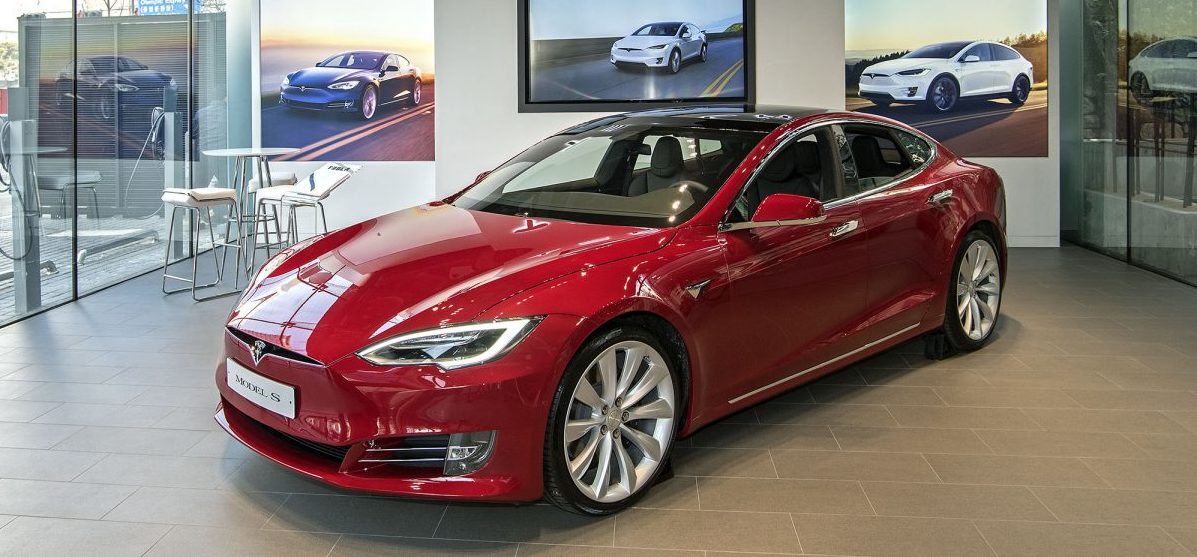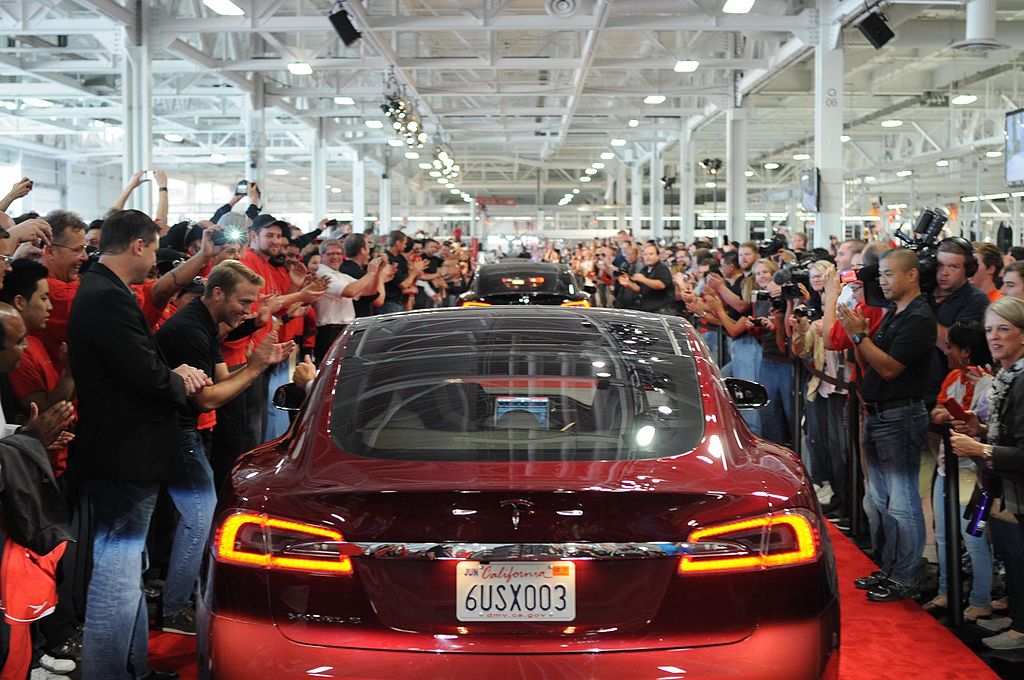

News
Tesla Model S hailed as fastest-selling 2nd hand electric car in the US
The Tesla Model S has been dubbed as the fastest-selling all-electric car in the United States’ second-hand car market from January to July this year. The full-sized premium sedan was given the distinction by automotive research firm iSeeCars.com, which aggregates second-hand auto listings across the country.
For its recent study, the auto research firm analyzed more than 4 million 1-3-year-old cars that were sold from January to July 2018. The firm noted in a report that overall, late-model vehicles usually take an average of 46.4 days before they are sold. iSeeCars.com CEO Phong Ly pointed out that cars which take longer to sell on the second-hand market usually signify that supply exceeds demand, while vehicles that are sold quickly usually connote that supply is lower than demand.
“It’s important to know how long vehicles stay on dealer lots because slower-moving cars can present negotiation opportunities for consumers. Cars that remain on market for longer than average indicate that supply is higher than demand, which could mean the pricing is too high or that the car isn’t as well-liked as its competitors,” Ly noted.
Among the United States’ available all-electric vehicles, the Tesla Model S stands as the fastest-selling used car from January to July. The all-electric car, which is designed by the company to be a vehicle that exceeds fossil fuel-powered competitors, spent an average of 32.4 days on used car dealer lots before getting sold. The iSeeCars.com CEO notes that such findings are primarily due to the Model S’ dominance in the premium all-electric car segment.
“The Model S is currently the only all-electric luxury car available, and its demand outstrips supply leading to scarcity in the used-car marketplace. Those who purchase a new model have to wait at least a month for delivery while there is no wait time for a used version,” Ly noted.
The Tesla Model S ranked as the second-fastest-selling used passenger car in the United States overall as well, directly behind the Toyota Prius C, an affordable hybrid vehicle that’s smaller than the full-sized Toyota Prius. The Prius C takes an average of 29.6 days before it is sold on second-hand dealer lots.
The findings of iSeeCars.com‘s study are in line with the results of another survey conducted by car-shopping platform Autolist.com last year. The results of Autolist.com‘s study concluded that used Tesla Model S sell 5% quicker than other luxury sedans from competing automakers such as the Audi A7, the Porsche Panamera, the BMW 6 Series, the Mercedes-Benz CLS, and even the Lexus LS 460. This was despite the average listing price of second-hand Model S being roughly 3% to 5% higher than comparable vehicles.

The number of the company’s electric cars on US roads is bound to increase, particularly since Tesla is now optimizing the production of the Model 3. With this, the second-hand market for the company’s electric cars would likely exhibit some growth. The impending rise in the number of Teslas on the road has been teased by Elon Musk in a letter to employees, where he noted that the company is “about to have the most amazing quarter in (its) history, building and delivering more than twice as many cars as (it) did last quarter.”
Considering that Tesla delivered a total of 40,740 vehicles and produced a total of 53,339 electric cars in Q2 2018, Elon Musk’s statement in his letter appears to be quite ambitious. That being said, Tesla board member Kimbal Musk noted during a recent segment on CNBC’s Closing Bell that this month would be pretty exciting for the company.
“This month is an exciting month for us. You know, it’s really gonna blow people’s minds how many Model 3s are gonna appear in America in just the next couple of weeks,” he said.
Watch Kimbal Musk’s discuss Elon Musk and the Model 3 in CNBC’s Closing Bell in the video below.
News
Tesla begins Robotaxi certification push in Arizona: report
Tesla seems serious about expanding its Robotaxi service to several states in the coming months.

Tesla has initiated discussions with Arizona transportation regulators to certify its driverless Robotaxi service in the state, as per a recent report from Bloomberg News. The move follows Tesla’s launch of its Robotaxi pilot program in Austin, Texas, as well as CEO Elon Musk’s recent comments about the service’s expansion in the Bay Area.
The Arizona Department of Transportation confirmed to Bloomberg that Tesla has reached out to begin the certification process for autonomous ride-sharing operations in the state. While details remain limited, the outreach suggests that Tesla is serious about expanding its driverless Robotaxi service to several territories in the coming months.
The Arizona development comes as Tesla prepares to expand its service area in Austin this weekend, as per CEO Elon Musk in a post on X. Musk also stated that Tesla is targeting the San Francisco Bay Area as its next major market, with a potential launch “in a month or two,” pending regulatory approvals.
Tesla first launched its autonomous ride-hailing program on June 22 in Austin with a small fleet of Model Y vehicles, accompanied by a Tesla employee in the passenger seat to monitor safety. While still classified as a test, Musk has said the program will expand to about 1,000 vehicles in the coming months. Tesla will later upgrade its Robotaxi fleet with the Cyercab, a two-seater that is designed without a steering wheel.
Sightings of Cybercab castings around the Giga Texas complex suggests that Tesla may be ramping the initial trial production of the self-driving two-seater. Tesla, for its part, has noted in the past that volume production of the Cybercab is expected to start sometime next year.
In California, Tesla has already applied for a transportation charter-party carrier permit from the state’s Public Utilities Commission. The company is reportedly taking a phased approach to operating in California, with the Robotaxi service starting with pre-arranged rides for employees in vehicles with safety drivers.
News
Tesla sets November 6 date for 2025 Annual Shareholder Meeting
The automaker announced the date on Thursday in a Form 8-K.

Tesla has scheduled its 2025 annual shareholder meeting for November 6, addressing investor concerns that the company was nearing a legal deadline to hold the event.
The automaker announced the date on Thursday in a Form 8-K submitted to the United States Securities and Exchange Commission (SEC). The company also listed a new proposal submission deadline of July 31 for items to be included in the proxy statement.
Tesla’s announcement followed calls from a group of 27 shareholders, including the leaders of large public pension funds, which urged Tesla’s board to formally set the meeting date, as noted in a report from The Wall Street Journal.
The group noted that under Texas law, where Tesla is now incorporated, companies must hold annual meetings within 13 months of the last one if requested by shareholders. Tesla’s previous annual shareholder meeting was held on June 13, 2024, which placed the July 13 deadline in focus.
Tesla originally stated in its 2024 annual report that it would file its proxy statement by the end of April. However, an amended filing on April 30 indicated that the Board of Directors had not yet finalized a meeting date, at least at the time.
The April filing also confirmed that Tesla’s board had formed a special committee to evaluate certain matters related to CEO Elon Musk’s compensation plan. Musk’s CEO performance award remains at the center of a lengthy legal dispute in Delaware, Tesla’s former state of incorporation.
Due to the aftermath of Musk’s legal dispute about his compensation plan in Delaware, he has not been paid for his work at Tesla for several years. Musk, for his part, has noted that he is more concerned about his voting stake in Tesla than his actual salary.
At last year’s annual meeting, TSLA shareholders voted to reapprove Elon Musk’s compensation plan and ratified Tesla’s decision to relocate its legal domicile from Delaware to Texas.
Elon Musk
Grok coming to Tesla vehicles next week “at the latest:” Elon Musk
Grok’s rollout to Tesla vehicles is expected to begin next week at the latest.

Elon Musk announced on Thursday that Grok, the large language model developed by his startup xAI, will soon be available in Tesla vehicles. Grok’s rollout to Tesla vehicles is expected to begin next week at the latest, further deepening the ties between the two Elon Musk-led companies.
Tesla–xAI synergy
Musk confirmed the news on X shortly after livestreaming the release of Grok 4, xAI’s latest large language model. “Grok is coming to Tesla vehicles very soon. Next week at the latest,” Musk wrote in a post on social media platform X.
During the livestream, Musk and several members of the xAI team highlighted several upgrades to Grok 4’s voice capabilities and performance metrics, positioning the LLM as competitive with top-tier models from OpenAI and Google.
The in-vehicle integration of Grok marks a new chapter in Tesla’s AI development. While Tesla has long relied on in-house systems for autonomous driving and energy optimization, Grok’s integration would introduce conversational AI directly into its vehicles’ user experience. This integration could potentially improve customer interaction inside Tesla vehicles.
xAI and Tesla’s collaborative footprint
Grok’s upcoming rollout to Tesla vehicles adds to a growing business relationship between Tesla and xAI. Earlier this year, Tesla disclosed that it generated $198.3 million in revenue from commercial, consulting, and support agreements with xAI, as noted in a report from Bloomberg News. A large portion of that amount, however, came from the sale of Megapack energy storage systems to the artificial intelligence startup.
In July 2023, Musk polled X users about whether Tesla should invest $5 billion in xAI. While no formal investment has been made so far, 68% of poll participants voted yes, and Musk has since stated that the idea would be discussed with Tesla’s board.
-

 Elon Musk1 week ago
Elon Musk1 week agoTesla investors will be shocked by Jim Cramer’s latest assessment
-

 Elon Musk21 hours ago
Elon Musk21 hours agoxAI launches Grok 4 with new $300/month SuperGrok Heavy subscription
-

 Elon Musk3 days ago
Elon Musk3 days agoElon Musk confirms Grok 4 launch on July 9 with livestream event
-

 News7 days ago
News7 days agoTesla Model 3 ranks as the safest new car in Europe for 2025, per Euro NCAP tests
-

 Elon Musk2 weeks ago
Elon Musk2 weeks agoA Tesla just delivered itself to a customer autonomously, Elon Musk confirms
-

 Elon Musk1 week ago
Elon Musk1 week agoxAI’s Memphis data center receives air permit despite community criticism
-

 Elon Musk2 weeks ago
Elon Musk2 weeks agoTesla’s Omead Afshar, known as Elon Musk’s right-hand man, leaves company: reports
-

 News2 weeks ago
News2 weeks agoXiaomi CEO congratulates Tesla on first FSD delivery: “We have to continue learning!”














